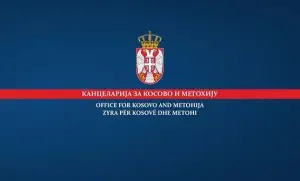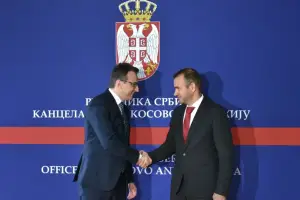Q:
A:
Only feasible decentralisation in Kosovo-Metohija acceptable for Belgrade
Belgrade,
8 August 2005
Head of the Coordinating Centre for Kosovo-Metohija Nebojsa Covic said today that Belgrade is ready to take on a constructive role in the decentralisation process in Kosovo-Metohija, but only if the process is feasible, honest, and subject to periodic evaluations.
At a press conference held at the Coordinating Centre, Covic presented a document on the level of standards achieved in Kosovo-Metohija, which had been previously considered and adopted by the Serbian government’s Council for Kosovo-Metohija. Covic pointed out that the document undoubtedly illustrates that the standards are far from being fulfilled, especially those important to Serb and other minorities.
Statements by officials from the international community unanimously infer that the status of the Serbian community is unacceptable and in discord with any standards, both in terms of basic human and democratic rights, Covic added.
He welcomed the decision by UNMIK and Kosovo interim self-government institutions to abandon the previous decentralisation plan, which came about because of serious drawbacks in the plan and because all communities in Kosovo-Metohija objected to such a plan. He noted that the plan raised the most objections from those to whom the plan was supposed to return life to normal conditions and to those displaced from the province.
According to Covic, the stumbling block in the process is a high level of insincerity on the part of political representatives of the ethnic Albanian community.
Asked to comment on an announcement from Pristina that there will not be a new decentralisation plan, but that the annulled one will be changed, Covic said that any variants of the plan may be proposed, though Belgrade will take no part in it.
“We are ready for constructive cooperation and this will be an opportunity for UNMIK and Kosovo interim self-government institutions to show in reality their declared dedication and political determination to improve the status of other communities”, Covic pointed out and added that Belgrade is interested in the process since it will be the basis for the return of Serbs.
Stressing that the decentralisation plan proposed by the Coordinating Centre for Kosovo-Metohija has been drafted by international experts, Covic said that the Centre is ready to take on an active role in the implementation of that plan.
Presenting a document prepared by the Council for Kosovo-Metohija that contains an assessment of the level of standards reached in the province, head of the Service for Return Coordination at the Coordinating Centre for Kosovo-Metohija Vladimir Cucic said that the international community's position towards the status of the province and the fulfilment of standards is constantly changing and is aimed mainly at the reduction of preconditions necessary for determining the province's future status.
Cucic explained that the international community reduced the number of standards from 400 to 200, and then again to 106.
As an example of unfulfilled standards, Cucic said that 29,000 farms belonging to Serbs and other non-Albanians have been appropriated by other persons, but no one has been legally prosecuted for these actions. This stands in contrast to the law prescribing a one-year prison sentence for such offences.
The participation of Serbs and other non-Albanians in public services has been reduced as well, from 22 to 8 percent. No explanation for such a reduction has been provided, Cucic said.
In Kosovo-Metohija, 52 companies have been privatised without Belgrade's consent, despite the fact that Belgrade is still repaying the province's foreign trade debt, which is valued at $1.5 billion.
Closing the presentation of the document, Cucic said that 682 refugees have returned to Kosovo this year, which is 0.2 percent of the total number of displaced persons.
Statements by officials from the international community unanimously infer that the status of the Serbian community is unacceptable and in discord with any standards, both in terms of basic human and democratic rights, Covic added.
He welcomed the decision by UNMIK and Kosovo interim self-government institutions to abandon the previous decentralisation plan, which came about because of serious drawbacks in the plan and because all communities in Kosovo-Metohija objected to such a plan. He noted that the plan raised the most objections from those to whom the plan was supposed to return life to normal conditions and to those displaced from the province.
According to Covic, the stumbling block in the process is a high level of insincerity on the part of political representatives of the ethnic Albanian community.
Asked to comment on an announcement from Pristina that there will not be a new decentralisation plan, but that the annulled one will be changed, Covic said that any variants of the plan may be proposed, though Belgrade will take no part in it.
“We are ready for constructive cooperation and this will be an opportunity for UNMIK and Kosovo interim self-government institutions to show in reality their declared dedication and political determination to improve the status of other communities”, Covic pointed out and added that Belgrade is interested in the process since it will be the basis for the return of Serbs.
Stressing that the decentralisation plan proposed by the Coordinating Centre for Kosovo-Metohija has been drafted by international experts, Covic said that the Centre is ready to take on an active role in the implementation of that plan.
Presenting a document prepared by the Council for Kosovo-Metohija that contains an assessment of the level of standards reached in the province, head of the Service for Return Coordination at the Coordinating Centre for Kosovo-Metohija Vladimir Cucic said that the international community's position towards the status of the province and the fulfilment of standards is constantly changing and is aimed mainly at the reduction of preconditions necessary for determining the province's future status.
Cucic explained that the international community reduced the number of standards from 400 to 200, and then again to 106.
As an example of unfulfilled standards, Cucic said that 29,000 farms belonging to Serbs and other non-Albanians have been appropriated by other persons, but no one has been legally prosecuted for these actions. This stands in contrast to the law prescribing a one-year prison sentence for such offences.
The participation of Serbs and other non-Albanians in public services has been reduced as well, from 22 to 8 percent. No explanation for such a reduction has been provided, Cucic said.
In Kosovo-Metohija, 52 companies have been privatised without Belgrade's consent, despite the fact that Belgrade is still repaying the province's foreign trade debt, which is valued at $1.5 billion.
Closing the presentation of the document, Cucic said that 682 refugees have returned to Kosovo this year, which is 0.2 percent of the total number of displaced persons.
Standards for Kosovo-Metohija: Review and the level of achievement (zipped MS Word document)
319.39 KB











